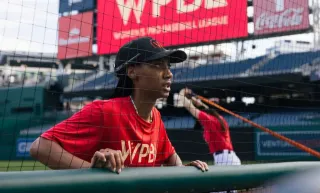
4 hours ago
'Harry Potter' Actress Barred from Fan Convention over OF Account
READ TIME: 3 MIN.
Jessie Cave, the British actress celebrated for her role as Lavender Brown in the Harry Potter franchise, has reported being barred from a major fan convention because of her presence on OnlyFans, despite her content being explicitly non-nude and focused on hair styling and so-called "hair fetish" themes. The incident has prompted widespread commentary about the boundaries between digital sex work, personal expression, and professional participation in public fandom events, raising pointed questions about ongoing stigmas faced by creators—particularly those from marginalized communities—who use adult platforms to support their artistic and personal endeavors .
According to Cave, the convention’s organizers cited the “family-friendly” nature of their event and a perceived association of OnlyFans with adult content as the reason for her exclusion. Cave shared the news in a public Substack post, expressing her confusion at the decision: “They explained it was because it's a 'family show and OnlyFans is affiliated with porn.' This was baffling to me, as some actors who do conventions have done TV and films in which they've done sex scenes and nudity. I'm just playing with my hair!” .
Launched earlier this year, Cave’s OnlyFans page, by her description, is intended to generate support for her writing and home repairs, and she has described the process as empowering after years of playing “prim” characters in mainstream media. She has been open about the platform’s challenges, including declining subscribers and unwanted explicit requests, but maintains that her own content is not sexual in nature .
Cave’s exclusion has revived debates about the treatment of sex workers and creators who use adult-oriented platforms, especially when their work falls outside explicit content. Many LGBTQ+ advocates point out that queer and transgender creators are disproportionately impacted by such stigmas, both online and offline, and that fandom spaces have historically been sites of both exclusion and solidarity for marginalized groups .
For LGBTQ+ communities, the controversy resonates with ongoing struggles for visibility and acceptance in mainstream spaces. Digital platforms such as OnlyFans have provided many queer and transgender individuals with avenues for financial independence and self-expression that are not always available in traditional media. However, platform stigma and the conflation of all adult platforms with explicit pornography continue to create barriers, leading to exclusion from events, payment processors, and even social media .
Despite the exclusion, Cave has stated she is “not upset about the prospect of no more Harry Potter conventions,” noting that she has participated in fan events for over 15 years and feels she has amassed enough memories and memorabilia. She also observed that the Harry Potter world is changing, with new casts and generational shifts in fan engagement .
Her situation has prompted a broader conversation among fans, particularly those from LGBTQ+ backgrounds, about the need for more nuanced and inclusive policies at conventions and other community events. Advocates argue that blanket bans based on platform association—rather than content—can reinforce harmful stereotypes and exclude people whose livelihoods or self-expression do not fit narrow definitions of “family friendly” .
The incident underscores ongoing tensions within fandom spaces about who gets to participate and who is deemed “appropriate.” For many LGBTQ+ individuals, as well as sex workers and digital creators, these decisions often reflect broader societal anxieties about sexuality, gender, and power. Groups such as GLAAD and the Human Rights Campaign have called for greater inclusion, better education about sex work, and the dismantling of harmful stereotypes that can disproportionately impact queer and trans creators .
Jessie Cave’s story is a reminder that the fight for full inclusion in both fandom and entertainment spaces is ongoing—and that policies based on fear and stigma rarely serve the interests of diverse, creative communities.






